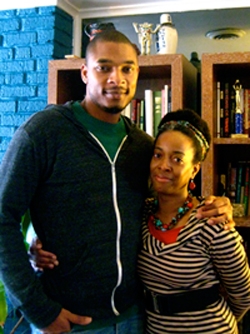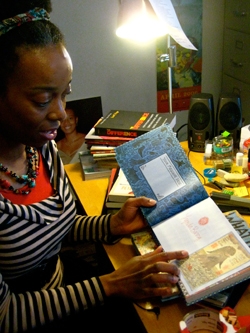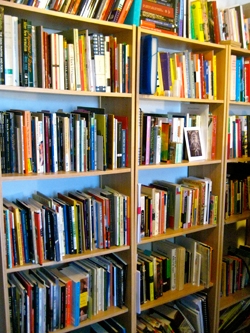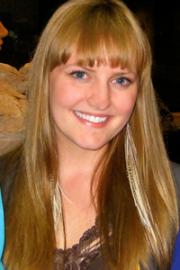A guest entering the home of Yona Harvey and Terrance Hayes might not guess that the two are poets. While books do greet visitors—a bookcase welcomes guests to the foyer, and shelves line the family’s living room—the real trove of books lives at the top of the house, in each poet’s office.
Harvey, whose work has appeared in several journals, including Ploughshares, Gulf Coast, and West Branch, teaches in the creative writing program at Carnegie Mellon University. Her first book, Hemming the Water, is forthcoming from Four Way Books. Hayes, also a professor of creative writing at Carnegie Mellon, is the author of Lighthead, winner of the 2010 National Book Award for Poetry. He has published three previous poetry collections and has won numerous honors and awards, including a Whiting Writers Award, a Pushcart Prize, and fellowships from the National Endowment for the Arts and the Guggenheim Foundation. Harvey and Hayes live in Pittsburgh with their two daughters.
 TriQuarterly Online: Let’s get started with this bookcase in the foyer.
TriQuarterly Online: Let’s get started with this bookcase in the foyer.
Terrance Hayes: Those are Yona’s books.
Yona Harvey: Right. These are things I’ve been reading more recently. And I just started running out of room upstairs.
TH: Those aren’t my books there, but I like walking into the house and seeing books. We are actually pretty territorial when it comes to our books.
TQO: So you don’t blend and merge your collections?
TH: There are places we share spaces—maybe in the living room. A few of my books are probably in her office.
YH: And vice versa. Our books used to be merged when we had a different house in Pittsburgh and because of space we had to share an office, but when we moved here we separated our offices.
TH: So the books are separate. Although you just brought me a book that I was looking for . . .
YH: There are so many of my books on Terrance’s shelves! [laughing]
TH: I kept saying, “Where is my book, where is my book?” I was looking for it everywhere.
YH: This is a classic argument here.
TH: And suddenly she brings it to me: “Oh, here it is.” [more laughter]
TQO: A poets’ argument, I guess?
YH: Yes. A classic Harvey-Hayes argument.
TH: Uh-huh.
YH: I’m sure I could find about a hundred of my books in your office.
TH: I don’t know about that. [smiling]
TQO: On to the living room?
TH: Public books. There’s a real mix in here. There’s hardly any poetry, but we hope it’s inviting to visitors. There’s a range of stuff in here: there’s a little bit of poetry, there’s fiction, there’s graphic novels. There are photo albums that live over here like books too.
YH: It’s kind of a strange mix: pictures, McSweeney’s, graphic novels.
TH: More of our books aren’t down here because even nonbooks get tossed here—a compass my brother sent, a bottle of saki from Japan, dolls and toys in front of the books.
YH: Right!
TH: It’s somewhere between a public library space and a public storage space.
TQO: I like the idea of public space.
TH: Right. The bookshelves are pretty much our entire living room. Yona’s Oxford English Dictionary is between the bookshelves. There’s also a stack of piano books under my piano. And [pointing to two chairs and a small table] this is a small stack now, but that’s typically where Yona has her reading.
YH: Of course now my daughter has taken over that space. Any space that I dig out suddenly becomes cool to her, so usually her books are over there too.
TH: In terms of collections and offices, this is just an entry into the space. We definitely keep our vital books in our offices upstairs. The books that really mean something to us wouldn’t necessarily be down here. If we were really spending time writing down here, it wouldn’t be organized this way.
YH: Upstairs?
TQO: I’ll follow you.
YH: I always wonder: people don’t usually come beyond the first floor, so I am sure sometimes people have thought, “Where are all the books?”
And at the top of the stairs, this is where we separate. This is my office on the right. I tried to clean up, but it didn’t go so well [laughs].
TH: [plops down on a small couch] I’m [going to] get the tour too. I’m just going to sit here and listen.
YH: At one point this was alphabetized, but it’s not anymore. I generally put poetry on the this side, although at the top I usually keep teaching books, how-to, prose, reference stuff—that’s all pretty consistent. Then it’s poetry, young adult, fiction, nonfiction over here. The many versions of my manuscript are over here [points to a stack of papers at least a foot high]. What else? At one point I was keeping the journals I was published in up here, but that kind of fell apart.
TQO: What are the books that you go to most often? Is there something you find yourself grabbing all the time?
YH: The stuff on my desk.
TQO: How does a book earn a spot on your desk?
YH: Nell Irvin Painter just came to Carnegie Mellon through the history department, and she [is] really cool—just a fascinating woman, really eclectic. She’s a retired Princeton professor, and now she’s gone back to get her MFA in art after all these years, so she’s painting and doing all of this wild stuff. But she’s a serious, respected historian too. So I’ve been trying to read her book The History of White People. And I always have Lynda Barry close by.
TQO: Why is that?
YH: She’s a graphic novelist. She’s on my desk because she paints and she writes a lot about writer’s block; she uses her art to get through her insecurities.
TQO: Sounds like a good book to have on your desk.
YH: She always includes a teaching component in the back of her books. It’s something that’s particular, I think, to graphic novelists, but to the women in particular. On their websites and in their books, she and Jessica Abel provide a how-to part where they demystify what they do and invite their readers to participate. I like that; I think it’s really cool. So that’s why I keep her around. And she’s funny—she illustrates her demons, like fear and doubt. [Yona flips through the book.]
 I guess that’s how a book gets a place on the desk. It’s just stuff I’m reading right now. Wang Ping is coming to Carnegie Mellon, so I’m looking back at her stuff now. Also Mark McGurl. And people that I keep reading over and over, like Michael Dickman. I’ve been on a Michael Dickman bandwagon lately.
I guess that’s how a book gets a place on the desk. It’s just stuff I’m reading right now. Wang Ping is coming to Carnegie Mellon, so I’m looking back at her stuff now. Also Mark McGurl. And people that I keep reading over and over, like Michael Dickman. I’ve been on a Michael Dickman bandwagon lately.
TH: Whose Black Life book is that—that Dorothea Lasky book over there?
YH: [laughs]
TH: That looks like one of my books.
YH: [still laughing] I don’t know what you’re talking about. I don’t have any idea. Fine—books do travel across the hall from time to time.
TQO: Of their own volition, right?
TH: The question is always, do we have two copies of this book? What was the last book we were talking about?
YH: It was Fred Moten. You were asking, “Is this mine? Or is this your copy?”
TH: So that’s the confusion. Sometimes I see it and I think, Maybe she bought her own copy, and then I think, Is that my copy? Which is why it never gets resolved. We just had a thing about our Charles Baxter book. He’s got this great collection of essays.
YH: Oh, Burning Down the House.
TH: Yes.
YH: The one that you falsely accused me of taking?
TH: I was absolutely convinced that she had my copy, because I couldn’t find it. She actually came around to thinking that she did have it, but then I found it. I had my own copy on the bookshelf.
YH: We like a lot of the same people. Or at least we talk about books a lot and recommend them to each other. So sometimes it does feel like you did read it or you do have it.
TH: This would be one way of thinking about what it means for two writers to live together—if we have two copies of a book it means that it’s an important work. The writers that we recommend, or those we know that we’re going to go back to more than once—those are the books that we end up with multiple copies of. That’s what I find. If Yona is really into a writer and I don’t have any of their books, I might come in and borrow it.
YH: What else can I tell you about this space?
TH: The back of your door is interesting [it’s covered in photos, cards, and clippings].
YH: I just need a lot of stuff around. I guess it’s inspirational, but that sounds so cheesy. But it’s true: visual things to keep me writing. Or people who support me. So of course, Terrance is up there. My mom and my sister. A little postcard from Sherrie Flick. The acceptance letter for my manuscript, yay! Stuff like that.
TQO: And the magazine clippings?
YH: Strong women, you know. Powerful women. A few troublemakers. They bring things out in the way they dress, or behave. And books. There are clippings about books I want to remember to order. Stuff like that. I’m a little bit of a . . . what do you call it?
TH: A hoarder.
YH: [laughs]
TH: Actually, I don’t come in here a whole bunch. When I’m in here, it’s like being inside Yona’s head. It’s everything that’s important to her. Little things like working out [points to a treadmill]. There’s a safe in here somewhere. Her artwork. Everything overlaps. And I don’t think of my office space that way. To come in here is to really be sitting in Yona’s mind. I find that really cool.
YH: So well said. I’m so glad to be married to you, because I can’t really explain it. Why am I so inarticulate about my own space? I’m just I’m glad to get up here. I just get to work. I don’t really think about it too much.
TQO: Do each of you do most of your writing in your offices?
YH: Yes.
TH: Me too. We definitely have different times of the day that we like to write.
YH: I don’t get anything done at a coffee shop or at Carnegie Mellon. Not anything creative or personal.
TH: But I’m rarely up here at this time of day. So it’s nice to see the light.
YH: Which is different from me. Even though I haven’t lately, I like to get up really early. Mornings are definitely my time. When noon hits, that’s it, it’s over.
Okay. Terrance’s office?
 TH: There’s no couch like in Yona’s office. You’ll see what I mean.
TH: There’s no couch like in Yona’s office. You’ll see what I mean.
My books are relatively alphabetized, and when I take a book out, I try to set it aside to put it back later. I probably organize my books twice a year, if I’m lucky. Honestly, I cleaned it up very recently.
Typically, all of this [points to the floor in front of his bookcases] is covered in books that I’m flipping through or reading. But I put them all in bags and out of the way. So this is really neat, but it’s usually a mess. The books themselves are usually organized, though. For instance, I was reading a bunch of Frank O’Hara, and they’re still sort of stacked here with the Os.
TQO: Do you divide them by genre at all?
TH: All four of these shelves are poetry. That last shelf over there is for older stuff. And then over here by the window, this is stuff I go to less often. It’s some of my publications and textbooks. And this other shelf by the window is one of the last bookcases that I brought in; it used to be downstairs. So again, those are books that I might go back to. But the easiest-access books are poetry books. And I have to remind myself to visit [the bookcases by the windows]. They’re mostly out of my mind. But again, reflecting on the different ways that our offices are set up: I actually don’t like to have any distractions, so my desk faces the wall. When I’m in my office, I’m in a little square—maybe a couple of squares: the computer screen, the paper, the book.
TQO: And Yona, your desk faces out toward the windows.
YH: Yes.
TH: Sometimes I think about moving it that way, but I know I’d be too distracted by things happening outside.
TQO: I notice that you two have matching shelving—four bookcases on walls that mirror each other.
TH: That’s right—because we buy them at the same time.
YH: At Ikea. [laughs]
TH: If Yona’s office is like her mind, mine is more like a cave. I’m not that interested in stuff on the walls. The few pictures on the walls are really there because I was inspired by the pictures Yona has in her office. But I mostly think of my office as a place to work—a cave or a work shed. I’m thinking about what I’m doing, but I’m not necessarily thinking about this space as a triggering place for ideas.
TQO: How do books earn a spot on your desk?
TH: It’s just stuff that I’ve been recently going through. I’ve moved a lot of these from downstairs. When I feel ready to clean up, I put a bunch of books in a bag and bring them up here from downstairs. I know I brought the David Foster Wallace from downstairs, because he was by my bed for a while.
YH: It’s funny because you always say that you’re not organized, but I think you really are. Or you just seem surer of the way that you work. I don’t find that you read an article on how to write and then want to try that out; it seems like for as long as I’ve known you, you’ve always been clear about how you work, how you write.
TH: I think I’m comfortable with chaos. I like the accident of having books around and then working and glancing around and saying, “This book will help.” So if it’s neater here, it feels more controlled in the moment of generation.


